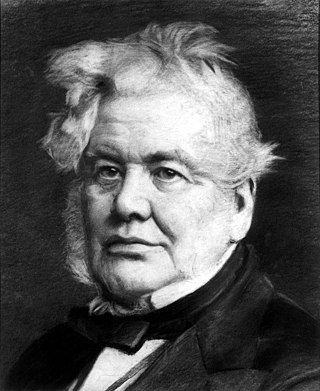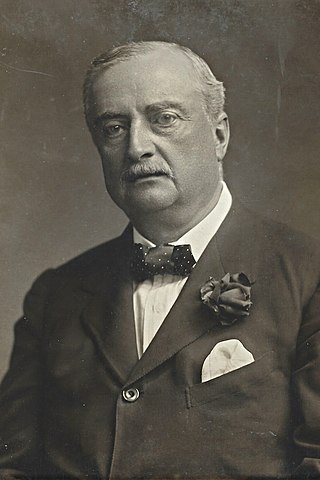Related Research Articles

Isaac Butt was an Irish barrister, editor, politician, Member of Parliament in the House of Commons of the United Kingdom, economist and the founder and first leader of a number of Irish nationalist parties and organisations. He was a leader in the Irish Metropolitan Conservative Society in 1836, the Home Government Association in 1870, and the Home Rule League in 1873. Colin W. Reid argues that Home Rule was the mechanism Butt proposed to bind Ireland to Great Britain. It would end the ambiguities of the Act of Union of 1800. He portrayed a federalised United Kingdom, which would have weakened Irish exceptionalism within a broader British context. Butt was representative of a constructive national unionism. As an economist, he made significant contributions regarding the potential resource mobilisation and distribution aspects of protection, and analysed deficiencies in the Irish economy such as sparse employment, low productivity, and misallocation of land. He dissented from the established Ricardian theories and favoured some welfare state concepts. As editor he made the Dublin University Magazine a leading Irish journal of politics and literature.

The 1918 United Kingdom general election was called immediately after the Armistice with Germany which ended the First World War, and was held on Saturday, 14 December 1918. The governing coalition, under Prime Minister David Lloyd George, sent letters of endorsement to candidates who supported the coalition government. These were nicknamed "Coalition Coupons", and led to the election being known as the "coupon election". The result was a massive landslide in favour of the coalition, comprising primarily the Conservatives and Coalition Liberals, with massive losses for Liberals who were not endorsed. Nearly all the Liberal MPs without coupons were defeated, including party leader H. H. Asquith.

The Government of Ireland Bill 1886, commonly known as the First Home Rule Bill, was the first major attempt made by a British government to enact a law creating home rule for part of the United Kingdom of Great Britain and Ireland. It was introduced on 8 April 1886 by Liberal Prime Minister William Gladstone to create a devolved assembly for Ireland which would govern Ireland in specified areas. The Irish Parliamentary Party under Charles Stewart Parnell had been campaigning for home rule for Ireland since the 1870s.

John Thomas Ball QC was an Irish barrister, judge and politician in the Parliament of the United Kingdom of Great Britain and Ireland, and Lord Chancellor of Ireland.
Anthony Lefroy was an Irish Conservative Party MP in the United Kingdom Parliament.
The Catholic Union was a political organisation in Ireland in the 1870s. It was the brainchild of Paul Cullen, Roman Catholic Archbishop of Dublin and future Irish cardinal. He created it in 1872 to link growing public interest in politics and Irish nationalism with a Catholic agenda. It was his second attempt to create a Church-orientated political party, following the collapse and failure of his first such organisation, the National Association.
The Irish Metropolitan Conservative Society was an Irish political movement based in Dublin which was linked to the Irish Conservative Party, the main political party in Ireland until 1859.
The Irish Conservative Party, often called the Irish Tories, was one of the dominant Irish political parties in Ireland in the 19th century. It was affiliated with the Conservative Party in Great Britain. Throughout much of the century it and the Irish Liberal Party were rivals for electoral dominance among Ireland's small electorate within the United Kingdom of Great Britain and Ireland, with parties such as the movements of Daniel O'Connell and later the Independent Irish Party relegated into third place. The Irish Conservatives became the principal element of the Irish Unionist Alliance following the alliance's foundation in 1891.

Sir Henry John Wrixon was an Australian barrister and politician.

The Irish Home Rule movement was a movement that campaigned for self-government for Ireland within the United Kingdom of Great Britain and Ireland. It was the dominant political movement of Irish nationalism from 1870 to the end of World War I.
Valentine Blake Dillon was an Irish lawyer and politician.
The Londonderry City by-election of 1872 was held on 23 November following the resignation of incumbent Liberal Party member of parliament Richard Dowse to become a Baron of the Exchequer. The Liberal vote was split as their candidate, Christopher Palles, was considered by Catholics as a "priest-hunter" for his prosecution of clergy as Attorney-General and denounced by Protestants for his views on education along denominational lines. The election was won by the Irish Conservative Party's Charles Lewis who secured a 174-vote majority. The election was the first Irish election to the British Parliament to be held by secret ballot.
The 1870 Dublin City by-election was fought on 18 August 1870. The by-election was fought due to the void election of the incumbent MP of the Conservative Party, Sir Arthur Edward Guinness. The election was voided because of his election agent's unlawful efforts, which the court found were unknown to the candidate.
The 1877 Dublin University by-election was fought on 13 February 1877. The by-election was held due to the incumbent Conservative MP, Edward Gibson, becoming Attorney-General for Ireland. It was retained by the incumbent.
The 1876 Leitrim by-election was fought on 14 July 1876. The byelection was fought due to the succession to a peerage of the incumbent Conservative MP, William Ormsby-Gore. It was won by the Home Rule candidate Francis O'Beirne.
The 1875 Armagh City by-election was held on 18 October 1875. The byelection was fought due to the death of the incumbent Conservative MP, John Vance. It was won by the Conservative candidate George Beresford.

The 1874 Dublin County by-election was fought on 18 March 1874. The byelection was fought due to the incumbent Conservative MP, Thomas Edward Taylor, becoming Chancellor of the Duchy of Lancaster. It was retained by the incumbent.
Charles William O'Hara, known as Charles William Cooper until 27 November 1860, was an Irish Conservative politician.

The 1900 United Kingdom general election in Ireland was held in September and October 1900. Ninety-nine of the seats were in single-member districts using the first-past-the-post electoral system, and the constituencies of Cork City and Dublin University were two-member districts using block voting.

The 1870 Londonderry City by-election was held on 15 February. It was a ministerial by-election, triggered by the appointment of Liberal Party member of parliament Richard Dowse as Solicitor-General for Ireland. The election was strongly contested by the Irish Conservative Party at a time when such by-elections were increasingly unchallenged. During this period the Catholic population of Londonderry tended to support the Liberals while the Protestant population supported the Conservatives. Dowse won, with a slightly reduced majority, and the result has been cited as evidence for the increasing co-operation between Episcopalian and Presbyterian voters in Ulster.
References
- ↑ "Leigh Rayment's Peerage Page". www.leighrayment.com. Archived from the original on 1 May 2008.
{{cite web}}: CS1 maint: unfit URL (link)